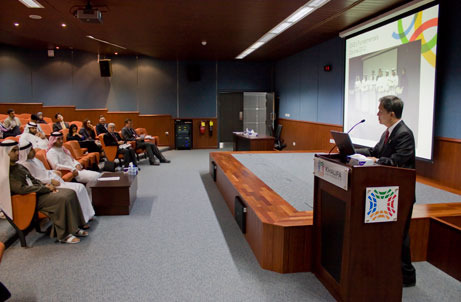
The Gulf Nuclear Energy Infrastructure Institute (GNEII) is set to begin the second year of courses at the Abu Dhabi campus of Khalifa University in the United Arab Emirates. The 2012 program will be divided into 4 month-long modules that will run from March 4th until September with multi-week breaks in between. Nineteen students from the Gulf region are currently attending the courses, which cover the technical foundations of nuclear energy, nuclear nonproliferation and safeguards, and nuclear security and safety, followed by a capstone module in which students research, prepare, and deliver presentations on relevant topics. Dr. Michael Schuller of the TEES Space Engineering Research Center (SERC) at Texas A&M University (TAMU) will serve as the faculty coordinator for the program and instructor for the Technical Foundations II and Nuclear Safety I portions of the curriculum. Other instructors from TAMU include Dr. Cable Kurwitz (Nuclear Technology Applications) of SERC, along Dr. Paulo Barretto (Nuclear Fuel Cycle), Dr. David Boyle (Technical Foundations), and Dr. Alexander Solodov (Nuclear Safeguards I & II), all of NSSPI.
GNEII was established in 2011 as a Khalifa University institute housing a regional education program offering both classroom instruction and hands-on experience in topics related to nuclear energy safety, security, safeguards and nonproliferation. Conceived as a response to the growing interest in nuclear energy among Middle Eastern nations, GNEII strives to promote a nuclear energy security and safety culture in countries in the region with nascent nuclear energy programs. The program is sponsored on the US side by the International Nuclear Safeguards and Engagement Program (INSEP) at the US Department of Energy / National Nuclear Security Administration, and the Partnership for Nuclear Security (PNS), which is a program of the US Department of State’s Office of Cooperative Threat Reduction. NSSPI has worked with Sandia National Laboratories to develop the curriculum and supply the instructors for the modules.
The pilot course for GNEII was a 13-week fundamentals module that took place in the spring of 2011 and graduated ten Emirati students from the three major, nuclear energy-related organizations in the UAE: the Emirates Nuclear Energy Corporation (ENEC); the Federal Authority for Nuclear Regulation (FANR); and the Critical National Infrastructure Authority (CNIA). The program for year two sees an expansion of the original program both in terms of the length and scope of the overall educational program as well as in the inclusion of Gulf region students from outside of the UAE.